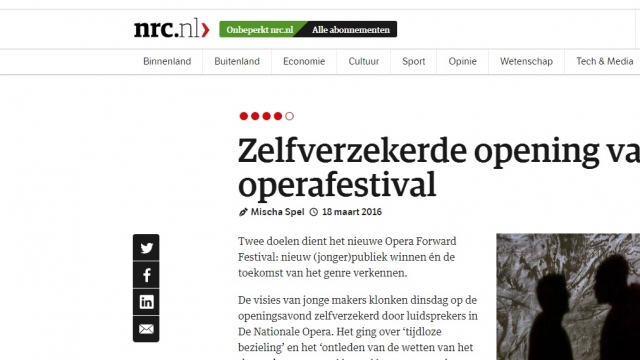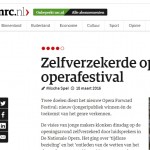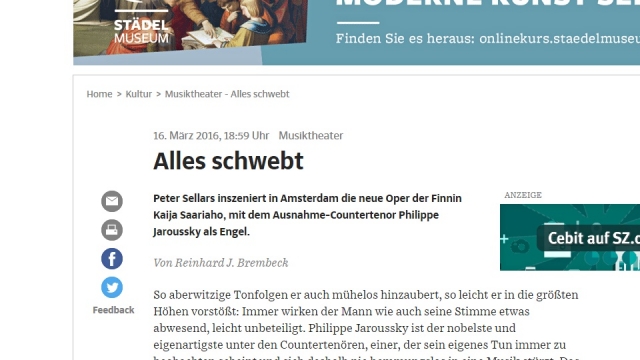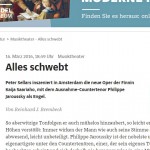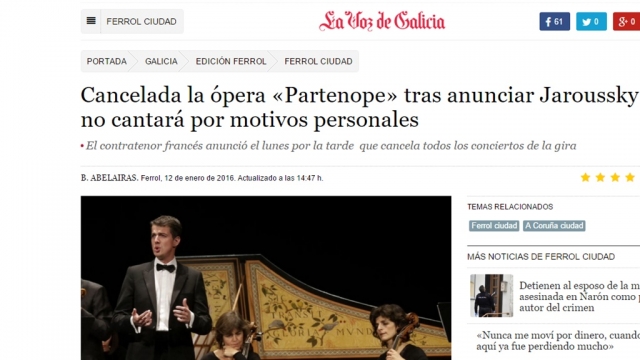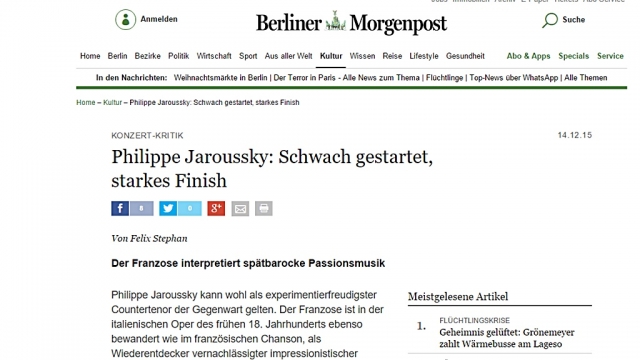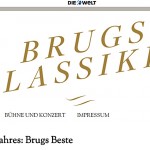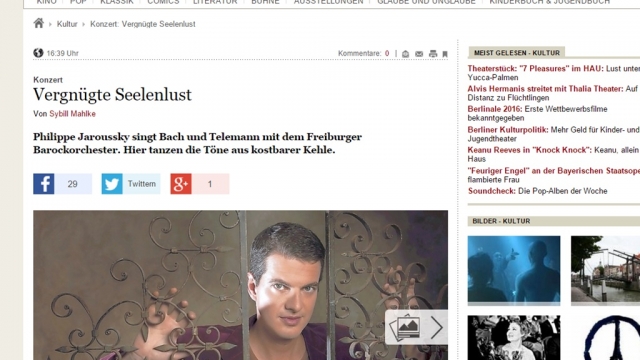2016-03-17, Die Welt, by Manuel Brug
Disclaimer
This is a fan translation – no infringement of copyright is intended. If you are the copyright holder and have any objections to this being online, drop us a line and we will remove it immediately.
We believe the publication fulfills the conditions of “fair use,” for discussion and study.
Source/Read more/See Original: [x]
~
Culture – Philippe Jaroussky
Can you resist this angel’s voice?
Finnish composer Kaija Saariaho composed two Japanese operas, tailor-made for the French countertenor Philippe Jaroussky. In Amsterdam now, he let them float.
[caption:] Definitely erotic undertones: Davone Tines, Philippe Jaroussky and Nora Kimball-Mentzos [translator’s note: names corrected] in “Feather Mantle”
Photo: Ruth Walz
The seventh sex. Naturally, its home being the world of singing and opera, with its more than 400 years of gender experimenting fun. After all, there have always been at least six instead of two or three music-theatrical varieties: soprano, mezzo, alto, tenor, baritone, bass.
In addition to that, since the Italian beginnings of the genre, one could never be sure who was wearing the breeches; after all, the play with the actual as well as symbolic guise continued to kindle the sensual desire of mankind. In summary, on stage the guys sometimes were women, whereas in church, angels sang who used to be guys – the castrati.
Since at least a century ago, the latter have been replaced – for humanitarian reasons – by countertenors. However, it has been a long journey until they their emancipation as popular stars. They have been stars in their own right for quite a while now, fitting a zeitgeist that likes to actively toy with gender and role models alike.
No opera house of distinction wants to go without a countertenor
There is hardly any baroque festival without an obligatory summit of countertenors, no opera house of distinction that wants to go without them. And even if – as it just happened in Vienna – based on concerns for suitability of the repertoire, the three countertenor-sisters in Péter Eötvös’ adaptation of Chekhov, “Tri sestri” are sung by women, there is yet another countertenor in the production providing a contrast. Moreover, at the most recent important world premiere at the same house, Aribert Reimann’s “Medea,” the important role of Kalchas was equally composed for a very high male voice.
Countertenor Philippe Jaroussky is reporting back in
Max Emanuel Cencic sang the part in 2010. In the meantime he has evolved from being a mere vocal star to a stage director, producer and agent in personal union as well – another expansion of borders. Maybe countertenors have become a normality. However, they continue to be marveled at more than other singers. And, in addition to that, to a growing extent, countertenors are being used in modern music. Contemporary composers quickly came to appreciate the spherical, pure, but also the extremely expressive qualities of these voices very quickly. Thus, this field is crowded with the most famous of the industry as well, not only with those whose voices won’t allow anything else.
At the English National Opera, the American Anthony Ross Costanzo, a darling of the Metropolitan opera, is triumphing in the title role of “Aknathen.” Right before, during this season, the 33-year old has been vitally contributing to two American opera novelties: as the stage manager – hectic as well as sensitive – in Jake Heggie’s comical backstage drama “Great Scott,” and as the enthusiastically singing terrorist Cesar in the hostage drama “Bel Canto” by Jimmy López.
Frenchman with an ethereal voice as clear as a bell
In that light, the Egyptian anarchic pharao Echnaton from Philip Glass’ opera, premiered 1984 in Stuttgart, is already a countertenor part of recent music theater history, just like Britten’s Oberon in “A Midsummer Night’s Dream,” and Apollo in his “Death in Venice” (1973). Or like Aribert Reimann’s evil bastard Edgar in “Lear” from 1978. Reimann’s next world premiere, planned for 2017 at the Deutsche Oper Berlin, after three one act pieces by Maurice Maeterlinck, is going to contain important tasks for countertenors as well.
Another countertenor – ardently admired by his fans – likes to emit his vocal art in contemporary music: the Frenchman Philippe Jaroussky, with an ethereal voice as clear as a bell. “The same way as I am devoting myself to the repertoire of French songs, I am trying, at least once a year, to schedule a performance of the orchestral song cycle, ‘Sonnets de Louise Labé’ that was composed for me,” he says. This season, he did this with sustained success at the Musikfest Berlin; before that, at the Salzburg Festival. Even an opera – up to now only having been performed concertante – was created for him: “Caravaggio” by Suzanne Giraud.
[caption:] Signs and sounds: Philippe Jaroussky in “Always Strong”
Following now in Amsterdam – as the opening event of the new “Opera Forward” festival of the Dutch National Opera, co-produced by the theatres in Helsinki, Paris, Lyon, Madrid, and Toronto – are the Jaroussky operas number two and three. Which are two almost one-hour one-act pieces by Kaija Saariaho, separate, but connected by more than just the title “Only The Sound remains.” It is the fourth opera project by the Finnish composer who is in high demand because she continues to be loyal to beautiful sounds indeed, who instantly became known with her first opera, “L’Amour de Loin” at the Salzburg Festival.
The Finnish zither in Japanese drama
Once again, just as in her former project, Peter Sellars is her director as well as giver of ideas. Together, they came up with two equally delicate as well as ephemeral texts from Nô theater plays in the adaption of Ezra Pound and Ernest Fenellosa. And because the shy and modest Saariaho thinks it is “completely pretentious” to try and compose in a Japanese idiom, naturally, she has been looking for an atmospheric equivalent.
On one hand, she found it in the use of the Finnish zither Kantele (played by Elja Krankaanrata), as a whispering, chirping, sometimes even shrill solo part in the already transparent fabric of sound she was weaving for the Dudok string quartet, the flutist Camilla Hoitenga (playing multiple instruments), and Niek KleinJan in charge of the percussion of manageable complexity.
On the other hand, Philippe Jaroussky became Saariaho’s male muse. In “Always Strong,” he embodies the spirit of a warrior fallen in battle whose lute a priest now wants to sacrifice to the gods. In “Feather Mantle” he is a Tennin, a kind of a Japanese version of an angel, whose lost feather mantle – without which he can’t fly – is found by a fisherman who returns it after initial refusal.
Generosity in the twilight
The airy texts are subtle and sensitive, philosophical parables about being and becoming, death and memory, generosity and gratitude. Peter Sellars stages them using his usual minimalistic sign language in the twilight, on a narrow strip of the stage before a black, white and grey prospect by the painter Julie Mehretu. Nothing much happens; it is all atmosphere and suggestion, collected like [droplets] in a tub by Saariaho’s sensitivity for sound, sprawling in what is almost a voluptuous way.
[caption:] The fight for the mantle: Davone TInes and Nora Kimball-Mentzos
Photo: Ruth Walz
Her small orchestra – flowingly and dynamically conducted by André de Ridder – is completed by a vocal quartet placed in the orchestra pit and is amplified, as well as electronically manipulated. This results in the music wafting, waving and surging across the room, in luminous richness and structural transparency, calm and clear in the first, entirely contemplative piece, slightly more lively and with more contrasting elements in the second piece that was composed first, which unfortunately doesn’t succeed in finding a proper ending – or rather, it finds too many.
Disturbing eroticising undertones
Remorseless revelling in pure decency. At least, Peter Sellars is adding a few disturbing eroticising undertones to the two operatic haikus in a gold frame, by developing some noticeable sensual desire between the two rivals, Jaroussky and the visually as well as vocally splendid baritone Davone Tines. In the second piece, this effect is mitigated by Nora Kimball-Mentzos, majestically interrupting with her dance.
But really, why shouldn’t angels and ghosts have any gender? After all, the occasionally still irritating voice of the countertenors heralds exactly this paradox. Someone might sound like an innocent child – yet be a real man. Of whom not just the sound remains.

